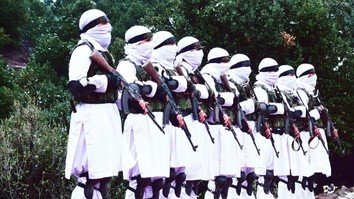KABUL -- No militant group has so far claimed responsibility for the powerful blast that ripped through Kabul's diplomatic quarter Wednesday (May 31), killing at least 90 people and wounding more than 400 others.
The widely condemned attack underscores how Kabul has become one of the deadliest places in Afghanistan for civilians.
As the silence stretches and public anger grows, here are the main suspects:
The Afghan Taliban
The Taliban have denied they were involved, but analysts say that should not be taken at face value.
Currently in the midst of their so-called "spring offensive", the Taliban -- who seek to drive foreign forces from Afghanistan and to rule the country through their extremist interpretation of Islam -- are by far its biggest and most powerful insurgent group.
They were ousted from power in 2001 but have seen a resurgence since the withdrawal of frontline NATO combat troops in 2014, briefly capturing key cities in addition to vast swathes of countryside.
In recent years the group -- sensitive about its public reputation -- has shied away from claiming attacks on civilian targets, though analysts believe this could be a tactic of convenience.
ISIS - Khorasan Province
The "Islamic State of Iraq and Syria" (ISIS), by contrast, has little hesitation in taking credit for bloody attacks, including those on soft targets.
It has carried out several attacks in Kabul, nearly as deadly as Wednesday's: last July it claimed a bombing that killed more than 80 people in the city.
In March, it claimed a deadly raid on Afghanistan's largest military hospital that officially killed 60 people, slaughtering patients in their beds -- though survivors and analysts suggested that attack also bore the hallmarks of the Taliban.
The group -- comprising mainly former disaffected Taliban and al-Qaeda fighters -- has gained some traction in Afghanistan since formally designating the country its "Khorasan" province.
The US military last month dropped its largest non-nuclear bomb on ISIS positions in Nangarhar Province, killing up to 90 insurgents, according to Afghan officials.
But while its supporters celebrated Wednesday's assault in Kabul on social media, the group has not claimed responsibility for the attack through its Amaq propaganda agency.
The Haqqani Network
Afghanistan's intelligence agency has blamed the Taliban-allied Haqqani Network for the attack.
Led by Sirajuddin Haqqani, who is also the Taliban's deputy leader, it has carried out numerous operations deep in the heart of Kabul, including the 2008 Indian embassy bombing that killed almost 60 people.
Pakistan launched a military operation targeting militant safe havens along the border with Afghanistan in 2014 that drove many, including the Haqqanis, over the border. They remain a force but have not carried out a major attack in some time.
Al-Qaeda and other groups
Al-Qaeda has been written off as a spent force by many following the killing of former leader Osama bin Laden in Pakistan in 2011.
Bill Roggio of the Long War Journal, while testifying before the US Congress in April, said this view was a mistake and that al-Qaeda's symbiotic relationship with the Taliban, which has strengthened, meant that "al-Qaeda has more areas to plant its flag".
Nevertheless, al-Qaeda has not carried out a significant attack in Afghanistan in years, and observers say it is unlikely to be behind Wednesday's blast.
Several Pakistani groups round out the militant landscape in Afghanistan, including Tehreek-e-Taliban Pakistan, Lashkar-e-Taiba and Harkat-ul-Mujahideen, none of whom are believed to have the capacity to have carried out Wednesday's attack in Kabul.

![Afghan security forces and residents stand near the crater left by a truck bomb in Kabul May 31. At least 90 people were killed, but no group has claimed responsibility for the carnage. [Wakil Kohsar/AFP]](/cnmi_st/images/2017/06/01/8066-000_p46bw-585_329.jpg)






